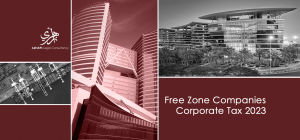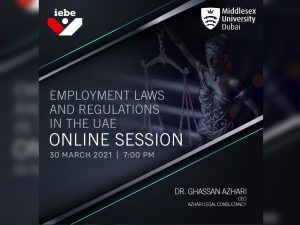This website uses cookies so that we can provide you with the best user experience possible. Cookie information is stored in your browser and performs functions such as recognising you when you return to our website and helping our team to understand which sections of the website you find most interesting and useful.
-

Will Be Free Zone Companies subject to the Corporate Tax?
As announced in January 2022, the United Arab Emirates will introduce a federal Corporate Tax […]
-

Protected: UAE Announced New Labour Law Regulations To Be Effective From February 2022
There is no excerpt because this is a protected post.
-

SCHOLZ KAUFT STEUERDATEN AUS DUBAI –
STRAFFREIHEIT DURCH STEUERLICHE SELBSTANZEIGE#SteuerlicheSelbstanzeige, #SteuerdatenDubai, #Steuerhinterziehung, #SteuerhinterziehungDubai, #SteuerstraftatenDubai, #SteuerdatenAusDubai SCHOLZ KAUFT STEUERDATEN AUS DUBAI STRAFFREIHEIT DURCH STEUERLICHE SELBSTANZEIGE […]
-

TODAY, Tuesday 30. March 7.00 PM: ‘Employment Laws and Regulations in UAE’ with Dr. Ghassan Azhari @ GoToMeeting Online
#LaborLaw, #LabourLaw, #DIFCLabourLaw, #LawyerDubai, #EndofServiceGratuity, #terminationofemploymentcontract, #arbitraldismissal On 30 March 2021, Dr. Ghassan Azhari held […]
-

Part 32 Offer – Early Disposal of Claims at DIFC Courts
Parties of a lawsuit can, and frequently do, attempt to settle a claim before having […]
-

Deutsche Influenzer in Dubai
Was brauche ich, um als Influencer in Dubai arbeiten zu können? Um als Influencer in […]
-

How to bequeath Bitcoin and other crypto currencies in the UAE
The UAE is governed by the UAE Federal Laws that give – so far – […]
-

Employers’ rights during the Covid-19 Crisis
Resolution No. 279 of 2020 issued by the Ministry of Human Resources and Emiratisation on […]
-

Dr. Ghassan held a seminar at the Middlesex University Dubai
On 10th and 11th November 2019 Dr. Ghassan held a seminar on the “UAE Economic […]
-

DIFC Enacts New Employment Law
The new DIFC Employment Law, Law No. 2 of 2019, which was enacted on 30th […]
Recent Posts
- Will Be Free Zone Companies subject to the Corporate Tax?

- Protected: UAE Announced New Labour Law Regulations To Be Effective From February 2022

- SCHOLZ KAUFT STEUERDATEN AUS DUBAI –

STRAFFREIHEIT DURCH STEUERLICHE SELBSTANZEIGE - TODAY, Tuesday 30. March 7.00 PM: ‘Employment Laws and Regulations in UAE’ with Dr. Ghassan Azhari @ GoToMeeting Online

- Part 32 Offer – Early Disposal of Claims at DIFC Courts




